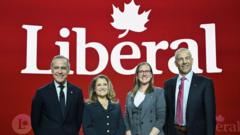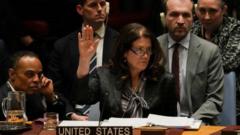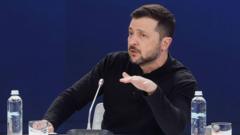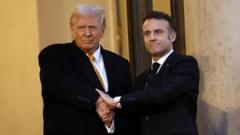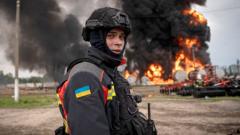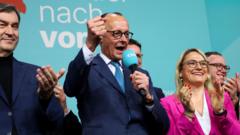In a bid to sustain transatlantic relations, Macron carefully addressed the conflict in Ukraine while engaging with Trump, highlighting the contrasting views within Europe on security and collaboration with the US.
Walking the Tightrope: Macron's Diplomatic Balancing Act with Trump on Ukraine
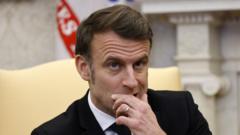
Walking the Tightrope: Macron's Diplomatic Balancing Act with Trump on Ukraine
French President Emmanuel Macron navigates a delicate relationship with Donald Trump while advocating for Europe’s role in Ukraine at the White House.
French President Emmanuel Macron's recent visit to the White House highlighted the increasingly strained relations between Europe and the United States, particularly in the context of the ongoing Ukraine conflict. During a joint press conference with President Donald Trump, Macron adeptly flattered and reassured the US leader, thereby maintaining a delicate balance in a challenging geopolitical landscape.
While both leaders expressed a desire for peace in Ukraine, Macron subtly corrected Trump regarding the perception of European support for Kyiv. He did, however, support Trump's notion that Europe must assume greater responsibility for its own security. In a surprising concession, Macron acknowledged the validity of Trump's approach to re-establishing communication with Russian President Vladimir Putin, a perspective diverging from the more isolationist policies historically embraced by European capitals such as Paris, London, and Berlin.
Macron proposed that countries like France and the UK could play pivotal roles in ensuring the security of a post-conflict Ukraine, potentially through military support distanced from frontline engagements. Despite this, he indicated the critical nature of having America's backing—a point left unassured during their discussions.
The meeting revealed the fractured state of transatlantic unity, as Macron aimed to bring Europe's voice to the forefront, yet did not elicit any critique from Trump regarding Putin. This has further underscored the diminishing closeness of US-European relations, prompting Macron to consider a more strategically autonomous Europe. German political figures, such as Friedrich Merz, echo this sentiment, emphasizing a need for European independence from US security reliance.
Furthermore, the shifting political landscape within Europe, characterized by the rise of far-right nationalist parties, reflects skepticism among European citizens regarding continued support for Ukraine. As UK Prime Minister Sir Keir Starmer prepares to visit Washington, he too finds himself navigating the complex waters of US-EU relations, seeking to leverage the longstanding ties between the UK and the US.
Ultimately, Macron's diplomatic maneuvers at the White House underscore the urgent need for Europe to rethink its strategic position amidst a growing divide with the United States—a challenge that not only affects security policies but also reshapes the future of European alliances in a volatile international system.


